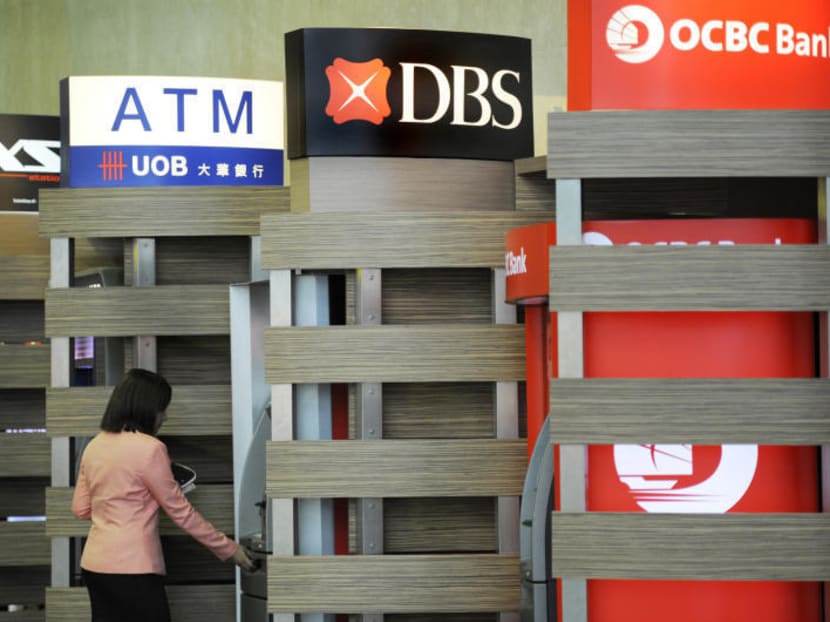Low take-up rate of repayment scheme sparks concerns
SINGAPORE — With less than two weeks to go before new borrowing limits kick in on June 1, the low application rate for a repayment scheme set up to help overextended borrowers has led to concerns among observers and some Members of Parliament (MPs) that a sizeable number could turn to more desperate measures after the banks suspend their credit facilities.

DBS, OCBC and UOB, the three largest local banks, have been communicating with affected customers and encouraging them to take up the Repayment Assistance Scheme (RAS), among other mitigation measures. Photo: Bloomberg
SINGAPORE — With less than two weeks to go before new borrowing limits kick in on June 1, the low application rate for a repayment scheme set up to help overextended borrowers has led to concerns among observers and some Members of Parliament (MPs) that a sizeable number could turn to more desperate measures after the banks suspend their credit facilities.
Already, pawnshops and moneylenders say they are seeing better business since the limits were announced last month.
Out of the estimated 32,000 borrowers who have interest-bearing unsecured debt over 24 times their monthly income, “over a thousand” applications to the Repayment Assistance Scheme (RAS) were received as of Sunday (May 17).
The scheme, which was set up by the Association of Banks in Singapore (ABS), has been operational since April 6. It offers a lower interest rate and an eight-year repayment period to help consumers reduce their unsecured debt over time.
Asked about the low application rate, ABS director Ong-Ang Ai Boon said it was premature to comment on it at this juncture.
She pointed out that affected customers have until Dec 31 to submit their applications. “We expect more RAS applications once the borrowing limit takes effect in June,” she said.
On their part, banks here are informing customers to update their income records and consider debt-repayment solutions such as the RAS or other plans coordinated by Credit Counselling Singapore, to reduce their debt gradually, she said.
The three largest local banks — DBS, OCBC and UOB — said they are on track to implement the borrowing limits. Customers who exceed the 24 months’ limit when the new rules kick in will have their borrowing facilities suspended.
The banks said they have been communicating with affected customers and encouraging them to take up the RAS, among other mitigation measures.
A Monetary Authority of Singapore spokesman reiterated that the authority, together with the industry are helping affected borrowers in a number of ways.
He noted that the new borrowing limit applies only to credit card and unsecured credit lines.
Citing the RAS, the spokesman said that MAS expects the financial institutions to reach out actively to borrowers who have accumulated high levels of debt to work out reasonable repayment plans.
Financial institutions may also extend credit to affected borrowers on “an exceptional and case-by-case basis”, depending on the specific circumstances of each borrower and the bank’s credit assessment.
Mr Ivan Ho, president of the Singapore Pawnbrokers’ Association, said the industry has been seeing a steady increase in business. “We expect it to pick up further over the year,” he said.
“While we do not dwell into why customers are coming to us, but we do know that many (credit) card holders eventually turn to us as they realise that they are not in position to roll over their debts any further and pledging their valuables is the only easy way out.”
Ms Yeah Lee Ching, executive director of ValueMax Group, added: “In contrast to credit card loans, borrowing from pawnshops is relatively cheap as there are no late fees or administrative fees for pawn loans and the interest rate charged is much lower.”
Moneylenders, too, are getting more customers, said Mr David Poh, president of the Moneylenders Association of Singapore.
He said: “As stricter borrowing limits on credit card holders are imposed ... we do see business improving. Though borrowing from moneylenders is more expensive, people come to us when banks close doors on them. For those used to living on borrowed money, (they) need to go somewhere for more money. We usually advise such customers to go for cheaper short-term loans customised for them.”
Noting that some people resort to borrowing from moneylenders, which provide cash with less hassle compared with banks, Ms Deborah Queck, executive director of Blessed Grace Gamblers Recovery Centre, said: “But as the interest rates increase and keep rolling, the borrowers will not be able to pay back as they keep owing more and more money.”
Mr Zainal Sapari, an MP for Pasir Ris-Punggol GRC, reiterated that the intent of the policy was not for affected borrowers to take up more loans to resolve their debt situation. Nevertheless, he said: “The MAS has to exercise flexibility to ensure that those people who owe more than 24 times of monthly income do not borrow more money.”
Ms Foo Mee Har, an MP for West Coast GRC, said the Government should ensure that policies for banks and moneylenders are coordinated. Currently, the two sectors operate under different frameworks, she noted. “When the banking sector tightens on its credit facilities, people might turn to moneylenders, who typically charge higher rates and impose tougher terms,” she said.
She strongly encouraged affected borrowers to take advantage of the RAS to “unwind their debt situation”. Referring to the scheme, she said she was glad that the Government had intervened and facilitated the debt restructuring at a much lower rate.





